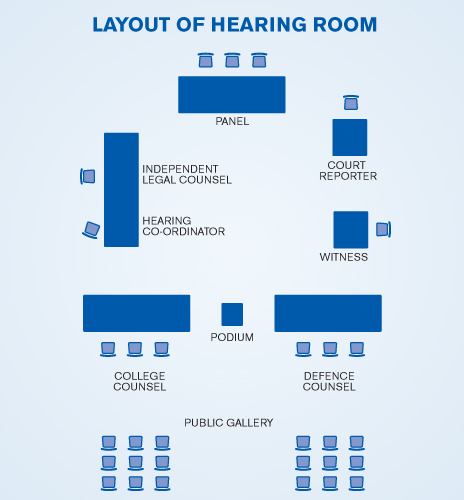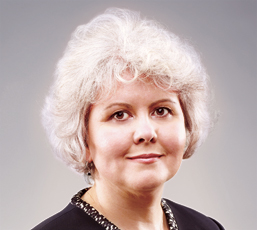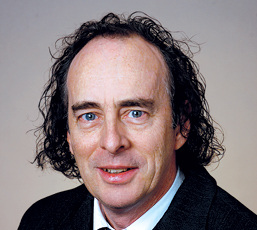|
|
COLLEGE MANDATEDiscipline hearings – protecting the public interestIt’s a Monday morning, early October, 9:30 AM. Classes are up and running around the province. Kids are learning, teachers are teaching. Situation normal. Except for one particular teacher. He’s facing a panel of his peers, defending himself in public against allegations of professional misconduct. The hearing room on the sixth floor of the College’s offices at 121 Bloor Street East in Toronto is plain and austere, simple yet serious, not unlike criminal courtrooms. The hearing itself is formal, conducted very much like a regular trial before a three-member panel, a mix of teacher-elected and government-appointed people. It’s their job to hear arguments, weigh evidence, determine whether professional conduct has been breached and order an appropriate penalty – all in the interest of protecting the public. Next to the defendant, at a table facing the panel and to the right of a podium, sits his lawyer, who argues his case against lawyers for the College (representing the public). The prosecution team is seated to the left of the podium. Today, the defendant is in attendance. That’s not always the case. Although they are served with a notice of the hearing, some members choose not to attend, letting lawyers represent their interests instead. In some cases the member is incarcerated following a criminal court decision and is prevented from attending.
At a table to the left of the panel sits the hearings co-ordinator, whose job it is to ensure that the hearing proceeds smoothly and that all participants have the necessary documents to consider in the matter. Independent legal counsel – usually a senior lawyer or retired judge – sits alongside the hearings co-ordinator. The independent legal advisor provides advice to the panel and helps to interpret and clarify legal matters. On the other side of the room, a court reporter captures every word of the proceedings. Transcripts are usually provided to the panel or the lawyers only if the hearing proceeds over several days or if the defendant wishes to appeal the decision to Ontario’s divisional court. Transcripts, however, can be purchased directly from the court reporting service. Near the court reporter, across from the hearing co-ordinator, there is a seat for any witnesses who may be called by either prosecution or defence. Gallery space is limited. It’s strictly first come, first seated. The public is welcome. Recording devices are not. Hearing participants and those in the audience rise when the panel enters the room and remain standing until invited by the panel to sit. The chair of the panel introduces the reason for the hearing and asks defendants how they plead (guilty, not guilty or no contest are the options). If there are requests for copies of the notice of hearing, agreed statements of fact or committee decisions – usually from the media – they are presented to the panel by the hearings co-ordinator. Once the panel reads the request into the record and legal counsel for both sides has been informed, the documents can be released. Agreed statements of fact are contained in the final written decision, which is available on written request to the College library at library@oct.ca. College lawyers present their cases on behalf of the public. The defence rebuts. Panel members can ask questions at any time or turn to the independent legal advisor as required. Most hearings last no more than a few hours. “A very small percentage of Ontario’s 220,000 certified, qualified educators cross the threshold of professional misconduct,” says the College’s Director of Investigations and Hearings, Francine Dutrisac, OCT. “Our goal is to ensure a fair and timely hearing for those who do and the right to full answer and defence.” Today’s hearing is one of about 75 that are conducted in any given year. “Hard-working, honest and ethical educators sometimes find it hard to fathom the College’s disciplinary process as a privilege of self-regulation,” says Discipline Committee Chair Jacques Tremblay, OCT. “We treat these matters with the utmost respect and seriousness. In every case we do what we think is in the best interest of Ontarians and Ontario students.”
The panel weighs all evidence, submissions, agreed statements of fact (if provided), the plea and the advice of legal counsel before deciding. Sometimes decisions come quickly, after a short recess to enable the panel to deliberate in another room. Sometimes decisions require much longer consideration and separate meetings to enable the panel members to further discuss the matter. The panel can issue orders from a range of penalty options including: reprimanding, admonishing or counselling a member or directing the Registrar to suspend the member’s teaching certificate for up to 24 months or to revoke it outright. In other cases, where the panel finds the member to be incompetent, it often directs him or her to take Additional Qualification or Additional Basic Qualification courses or courses in classroom management. The Discipline Committee panel can also impose specific terms, conditions or limitations on a certificate. For example, members found guilty of professional misconduct may be ordered to complete courses pre-approved by the Registrar, at their own expense, in cases where physical or ethical boundaries have been violated. Members can also face fines up to $5,000 or be ordered to pay costs. Today’s panel issues an oral decision: suspension and conditions. A written decision will follow later and contain the allegations, pertinent facts supported by evidence and the reasons for the decision and the penalty. The panel has also ordered publication of a summary of its decision in the College’s official publication, Professionally Speaking. Says Tremblay, “Publication helps to ensure that the public remains confident that all College members are committed to the safety of children and the integrity of our education system. We do that by demonstrating that the teaching profession deals with professional misconduct appropriately.” |














